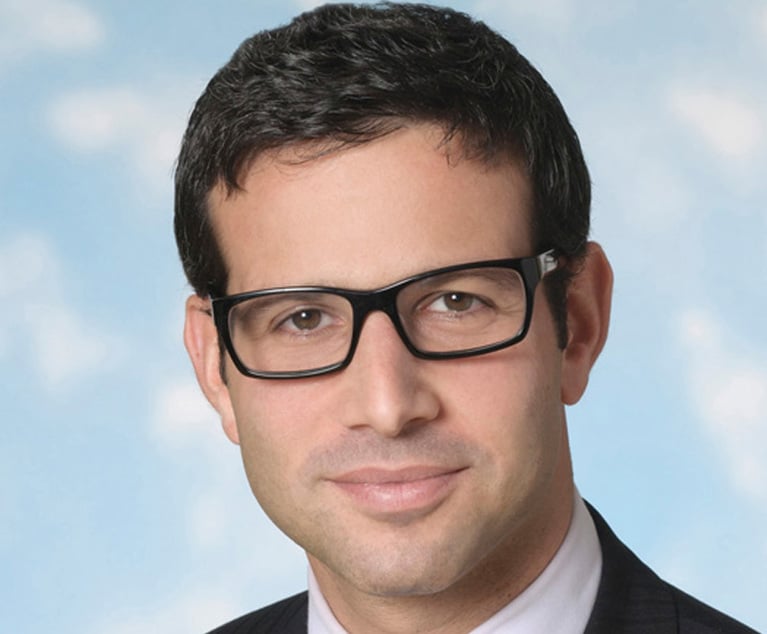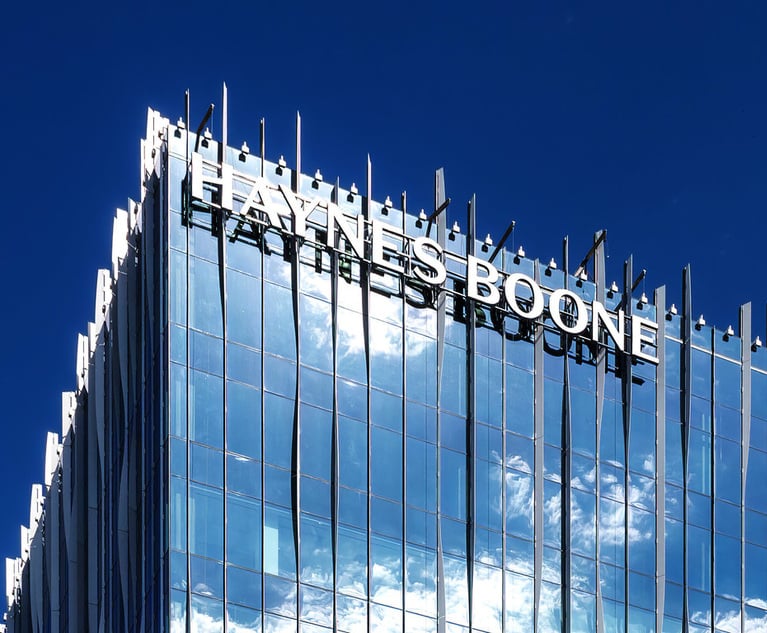 Robert S. Safi, partner with Susman Godfrey.
Robert S. Safi, partner with Susman Godfrey.On the Rise 2018: Robert S. Safi
Robert S. Safi, partner, Susman Godfrey
August 31, 2018 at 06:00 AM
6 minute read
Robert S. Safi, partner, Susman Godfrey
Experience:
- Susman Godfrey, 2006–present
- Hon. Vaughan Walker, then-Chief Judge, U.S. District Court, Northern District of California, 2005-2006
Education:
- University of Texas School of Law, 2005
- University of Texas at Austin, 2002
What drew you to a career in law?
Although I come from a family of lawyers, and was nudged in the direction of law from a young age, law was not my first choice. Contrarian by nature, I resisted that for years. In college (UT Austin), I was drawn down a different path: house and techno music. I put most of my energy into becoming a working DJ while moonlighting as a student. I had a successful run performing and promoting events at clubs and larger venues, and loved every minute of it. But that existence came at the expense of my college education; I graduated by the skin of my teeth.
I realized that, long term, the life of a DJ was not for me. And, I wanted a second chance academically. Law school felt right. The research for my undergraduate thesis included reading a bunch of U.S. Supreme Court opinions, and that study of the legal process had fascinated me. By providence, I was admitted to The University of Texas School of Law, and my awesome experience at that institution sealed my fate of becoming a trial lawyer.
Have you set a specific goal that you want to achieve in the next year?
Winning a blockbuster jury verdict for my client Mirada Energy in its dispute with Oasis Petroleum.
What has been your proudest career moment and your biggest hurdle?
As a young lawyer, my proudest career moment was my first jury verdict. I second-chaired Steve Susman. The legendary David Beck was on the other side. Even so, Susman let me give the opening and cross-examine witnesses. My presentation had more passion than polish, but we won, and afterward all the jurors who responded to our post-verdict questionnaire said I was as effective as Susman. That experience taught me I could do just fine as a trial lawyer by trusting my instincts and being myself. Coming to that realization early in my career was a real blessing.
Recently, my proudest career moment was winning a Tenth Circuit judgment of affirmance in Spring Creek Exploration & Production Company et al. v. Hess Bakken Investments II, LLC et al. It was the first complex, nine-figure case that I took from filing to final judgment as leader of the trial team. Don't get me wrong: It's always a team effort, and Susman Godfrey assembles dynamite trial teams. But the confidence that comes from making—when the buck stops with you—myriad strategic decisions and judgment calls over the life of a tough case and seeing that culminate in victory—there's no substitute for that in a young litigator's professional development.
My biggest hurdle has been myself. Success in law school has a way of overinflating the egos of those who let it, as I did. Coming to grips with the fact that I'm not always right, and that my way isn't always the best way—that took some time for me, and there was plenty of humiliation along the way.
Where do you fit on a 1-10 work-life balance scale with 10 being nirvana? Please explain.
8. Susman Godfrey partners have the freedom to find the work-life balance that suits them and their families. That flexibility has allowed me to keep my docket of active matters to just a handful at any given time so that I can immerse myself in each one while still having time for family and fun. Technology also helps. Going paperless and having everything with me at all times on my iPad helps me better allocate time among my clients and my family. Sure, I could work longer hours and make more money. But I get to spend time with my wife and young daughter most every morning, evening, and weekend. I wouldn't trade that for anything, and am blessed to work at a firm that lets me to make that choice.
What is the top quality that you've used to succeed in the profession?
Not being satisfied with “good enough.”
Who is your favorite mentor and why?
I have two.
My father, S. Anthony Safi: Dad instilled strong writing fundamentals by mercilessly taking a red pen to my work when I was still just a kid. I still count on him for wise, spot-on counsel. Whether it's a matter of strategy or ethics, or even just a question of law, his compass always points me in the right direction.
My law partner, Geoffrey L. Harrison: Geoff is a consummate trial lawyer who advocates as he lives—with flair. He holds himself to a standard of excellence in a way that inspires others to do the same, all while being himself and having fun. He's a wonderful role model, and usually the first “senior” lawyer at the firm I go to for guidance. In his office, you can count on good advice and a good laugh.
What's the best advice anyone has ever given you?
Do right and risk the consequences.
What trends are you observing in the profession that you're excited about?
Diversity: There are plenty of reasons the profession should make this a priority. At Susman Godfrey, increasing the diversity of our lawyers has enriched the community of the firm and made it a more interesting place to practice law.
Technology: The more mundanity that technology can drive out of the practice, the happier we'll all be. I'm not worried about a robot replacing me anytime soon.
What is the greatest challenge you see for the legal profession?
The vanishing trial, especially the vanishing civil jury trial. It is common knowledge that the percentage of civil disputes that are resolved by juries is declining. Our firm founder, Steve Susman, has taken great strides in exploring this trend and how, ultimately, we can protect the Seventh Amendment right to a jury trial in civil cases. His work through The Civil Jury Project at NYU School of Law is important both to the legal profession and our democratic society as a whole.
This content has been archived. It is available through our partners, LexisNexis® and Bloomberg Law.
To view this content, please continue to their sites.
Not a Lexis Subscriber?
Subscribe Now
Not a Bloomberg Law Subscriber?
Subscribe Now
NOT FOR REPRINT
© 2025 ALM Global, LLC, All Rights Reserved. Request academic re-use from www.copyright.com. All other uses, submit a request to [email protected]. For more information visit Asset & Logo Licensing.
You Might Like
View All
Kirkland's Daniel Lavon-Krein: Staying Ahead of Private Equity Consolidation

Vinson & Elkins: Traditional Energy Practice Meets Energy Transition
4 minute read
Advising 'Capital-Intensive Spaces' Fuels Corporate Practice Growth For Haynes and Boone
4 minute read
Get to Know Texas Lawyer's Attorney of the Year Finalists
Trending Stories
- 1People in the News—Jan. 2, 2025—Eastburn and Gray, Klehr Harrison
- 2Deal Watch: Latham, Paul Weiss, Debevoise Land on Year-End Big Deals. Plus, Mixed Messages for 2025 M&A
- 3Bathroom Recording Leads to Lawyer's Disbarment: Disciplinary Roundup
- 4Conn. Supreme Court: Workers' Comp Insurance Cancellations Must Be Unambiguous
- 5To Avoid Conflict, NYAG Hands Probe Into Inmate's Beating Death to Syracuse-Area DA
Who Got The Work
Michael G. Bongiorno, Andrew Scott Dulberg and Elizabeth E. Driscoll from Wilmer Cutler Pickering Hale and Dorr have stepped in to represent Symbotic Inc., an A.I.-enabled technology platform that focuses on increasing supply chain efficiency, and other defendants in a pending shareholder derivative lawsuit. The case, filed Oct. 2 in Massachusetts District Court by the Brown Law Firm on behalf of Stephen Austen, accuses certain officers and directors of misleading investors in regard to Symbotic's potential for margin growth by failing to disclose that the company was not equipped to timely deploy its systems or manage expenses through project delays. The case, assigned to U.S. District Judge Nathaniel M. Gorton, is 1:24-cv-12522, Austen v. Cohen et al.
Who Got The Work
Edmund Polubinski and Marie Killmond of Davis Polk & Wardwell have entered appearances for data platform software development company MongoDB and other defendants in a pending shareholder derivative lawsuit. The action, filed Oct. 7 in New York Southern District Court by the Brown Law Firm, accuses the company's directors and/or officers of falsely expressing confidence in the company’s restructuring of its sales incentive plan and downplaying the severity of decreases in its upfront commitments. The case is 1:24-cv-07594, Roy v. Ittycheria et al.
Who Got The Work
Amy O. Bruchs and Kurt F. Ellison of Michael Best & Friedrich have entered appearances for Epic Systems Corp. in a pending employment discrimination lawsuit. The suit was filed Sept. 7 in Wisconsin Western District Court by Levine Eisberner LLC and Siri & Glimstad on behalf of a project manager who claims that he was wrongfully terminated after applying for a religious exemption to the defendant's COVID-19 vaccine mandate. The case, assigned to U.S. Magistrate Judge Anita Marie Boor, is 3:24-cv-00630, Secker, Nathan v. Epic Systems Corporation.
Who Got The Work
David X. Sullivan, Thomas J. Finn and Gregory A. Hall from McCarter & English have entered appearances for Sunrun Installation Services in a pending civil rights lawsuit. The complaint was filed Sept. 4 in Connecticut District Court by attorney Robert M. Berke on behalf of former employee George Edward Steins, who was arrested and charged with employing an unregistered home improvement salesperson. The complaint alleges that had Sunrun informed the Connecticut Department of Consumer Protection that the plaintiff's employment had ended in 2017 and that he no longer held Sunrun's home improvement contractor license, he would not have been hit with charges, which were dismissed in May 2024. The case, assigned to U.S. District Judge Jeffrey A. Meyer, is 3:24-cv-01423, Steins v. Sunrun, Inc. et al.
Who Got The Work
Greenberg Traurig shareholder Joshua L. Raskin has entered an appearance for boohoo.com UK Ltd. in a pending patent infringement lawsuit. The suit, filed Sept. 3 in Texas Eastern District Court by Rozier Hardt McDonough on behalf of Alto Dynamics, asserts five patents related to an online shopping platform. The case, assigned to U.S. District Judge Rodney Gilstrap, is 2:24-cv-00719, Alto Dynamics, LLC v. boohoo.com UK Limited.
Featured Firms
Law Offices of Gary Martin Hays & Associates, P.C.
(470) 294-1674
Law Offices of Mark E. Salomone
(857) 444-6468
Smith & Hassler
(713) 739-1250






